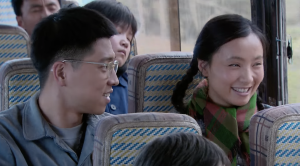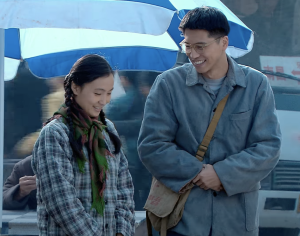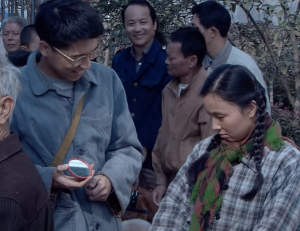It has been proven that silence over time can drive you crazy. In 2015, Microsoft designed a room that has since been dubbed the world’s quietest room. After five minutes in this room, you’ll be able to hear your heartbeat. After ten minutes, you’ll hear your bones creaking and blood flowing through your body. After 45 minutes, some had succumbed to mental insanity. It is not fun to be forced to be completely silent: it is restricting, it is uncomfortable, and it is isolating. But despite this, women all across China have been expected by their peers, families, and society at large to remain silent throughout their whole lifetime. To never speak up with commentary, suggestions, or complaints. To me, this is a heartbreaking hypocrisy: if we can’t survive less than an hour in dead silence, how do we expect women in China to live with it their entire life? Unfortunately, women in China have been taught to internalize silence both physically and mentally as the norm since young, allowing the patriarchy to perpetuate traditional Chinese notions while successfully resisting social pushback, restricting women from achieving social and gender equality as a result.
The theme of Spring Grass’s silence, alongside the silence of countless women across China, runs consistent throughout the narrative of the novel and Chinese society. Ever since the rise of the Zhou Dynasty in 1046-256 BC, villagers in China had already embraced gender associated role-based beliefs such as “women never talk outside”, beliefs that greatly restricted a woman’s freedoms (Wong, 345). This is seen time and time again in Spring Grass, where the titular character’s inability to speak her thoughts is consistently highlighted throughout the novel. From a structural perspective, the author intentionally skips multiple years in Spring Grass’s life between chapters when narrating the story. She constantly uses phrases that reflect time passing incredibly quickly, such as “In the blink of an eye, Spring Grass had become a young woman of twenty” at the beginning of chapter 6, even though she was merely 15 a couple of sentences ago (Spring Grass, Chapter 6). The deliberate choice to skip over 5 years of Spring Grass’s life could highlight the fact that the narrator doesn’t know too much about the specific ongoings of Spring Grass’s life because she has been taught not to speak out or share her experiences with the fellow townsfolk. This symbolism highlights how women have been told that they shouldn’t talk about their lived experiences because it doesn’t matter to others, or in Spring Grass’s case, the reader. This is especially true because the years that the author chooses to skip over are Spring Grass’s teenage years, perhaps the most important years in the development of her identity and character. The choice to skip over these years, even though they are very few in number, is a blunt signal to the audience that who Spring Grass is and who she becomes is not important that we shouldn’t care about her – a similar narrative that was publicized to most women during the time. In fact, this technique is constantly seen throughout Chinese history, where fathers and other central familial figures leave a “legacy of no self-worth, the central theme in all girl’s upbringing (Wong, 352)”, which is enforced specifically to ensure that girls would be scared to speak their minds. If they felt that whatever they could contribute to a conversation was worthless, they would be scared into silence. This is perhaps the cause of Spring Grass’s “face flushed crimson whenever she stood up to speak (Spring Grass, Chapter 4)” in class, as she is convinced that what she has to say is worthless and she’ll just embarrass herself in front of the whole class. Women in China, then, default to silence as the norm because their family education had taught them that their contribution to speaking, sharing, and conversing was absolutely worthless.
Even when Spring Grass wants to express her true feelings to others, she knows that no one will listen and respect her thoughts. After every one of her retorts towards her father in an argument about how she can’t go to school anymore, the narrator makes sure to follow it up with “Of course, Spring Grass did not make this last reply aloud (Spring Grass, Chapter 5).” The resolute diction used by the author emphasizes how ridiculous it would be for Spring Grass, a girl, to challenge and talk back to his father, the head of the family, which reiterates how entrenched this norm that girls should stay silent is within Spring Grass’s psyche. But more importantly, the intentional choice by the author to only bring up the fact that Spring Grass didn’t say this out loud in the paragraph after the retort highlights how badly she wanted to say these thoughts to his father; that for a brief second she could live in a fantasy world where she could and do express her feelings out loud, before being brought back to reality. She knows she can’t talk back to her father because “no matter how much her father feared her mother they were on the same side (Spring Grass, Chapter 5)”. This highlights the dire desperation within many women to be heard by those around them. But in reality, they have been indoctrinated into thinking that no one, even their parents, supports how they feel and is on their side. They feel like they are all alone in this world, making it harder for them to want to speak out about their feelings. Perhaps this is why when Spring Grass was frustrated about the fact that she had to stay home and couldn’t go to school, she ran to the hilltop, far away from her village to yell out her angst and frustrations. The physical distance between the hilltop and Spring Grass’s village reflects the metaphorical distance Spring Grass feels between her and her parents, strengthening her belief that her parents don’t care about her feelings or understand her. This makes it harder for Spring Grass to come out to them about certain issues she might be facing. This idea is then strengthened by the fact that “only the birds in the woods knew of her sorrow (Spring Grass, Chapter 5)”. The fact that the only things Spring Grass trusts with her sorrows and emotions are birds, entities who can’t judge her, shows how afraid Spring Grass is of telling others about her feelings. Additionally, Spring Grass deliberately trusts birds who don’t understand why she’s sad at all, over the comfort of her own home and parents, which further emphasizes the extent she feels her family doesn’t understand or care about her pain. This acts as a positive feedback loop, pushing Spring Grass and many other women around China into feeling like they’re even more alone in their pain, making it harder for them to want to speak out about their feelings because no one would understand them.
This strict reinforcement of silence within women was viewed by the patriarchy as crucial to allowing the man’s will to dominate throughout China. Without women being able to question their position within society or challenging patriarchal norms, it was much easier for men to enforce their will within the household and in society at large. As a result, many within the Ming Dynasty subscribed to this idea that giving women access to education was detrimental to the patriarchal social fabric that existed at the time, as they “fear[ed] that [women] might become over ambitious (Wong, 346).” Education and a woman’s ability to speak up, then, were inextricably linked with one another as access to education expanded one’s capacity to advocate for themselves and ability to break out of silence. Without classes that taught women how to read and write, they would never have the means to effectively communicate injustices they’re facing to other women, allowing the patriarchy to go accepted and unchallenged by most families. In turn, this allowed for the “sole aim of girls’ upbringing… [to be] tailored precisely towards the need to maintain male domination (Wong, 349)”, stripping away women’s means to achieve equality. The Chinese patriarchy was so effective in this regard that not only did the women’s rights movement in China not rise until the late 19th century, but it was only when male feminists, such as that of Li Ruzhen, wanted to fight for gender equality did it occur. This proves how effective keeping women in China silent was towards ensuring gender inequality because with women conditioned to stay silent about their oppression and without the proper tools to communicate their oppression, it was difficult for them to rile up support for any form of a feminist movement. This is especially seen in Spring Grass. When Spring Grass attempts to fight against not being able to go to school, she chooses to sit in her room in silence as her method of protest (Spring Grass, Chapter 3). The irony here is that Spring Grass’s most effective method of speaking up for what she wanted was through not saying anything, highlighting how through anything and everything, women have been socialized and conditioned to turn towards silence. Even in power, they only have silence to accompany them.
To justify this narrative that women ought to be silent, the Chinese patriarchy perpetuated countless disturbing narratives that seriously affected the self-esteem and humanity of countless women across the country. Perhaps the most salient example of this is through the promotion of the idea that women are represented by Yin, a side that has often been associated with evil, chaos, and darkness. This is evident in the rhetoric Spring Grass’s mom uses to speak to Spring Grass, constantly referring to her as a “demon’s child”, or “a curse straight from hell (Spring Grass, Chapter 1)”. The association of such fear mongering diction towards the nature of who women are has allowed for men to justify the implementation of such restrictive rules on women’s rights. To prevent the woman’s “evil” from spreading, Ban Zhao’s Book of Indoctrination claims that a women’s behavior should be constrained in many ways, including “not burst into laughter when feeling happy… not should when feeling angry. (Wong, 348)” The shocking irony here is that while men at the time feared that women might turn into these evil, unnatural spirits if left uncontrolled, yet the ways they chose to control women are inherently unnatural themselves.
Obviously, this is not to say that women have never tried to fight back against this silence. We see this in the Hidden Letters documentary, where women from Jiangyong developed their own writing system and language that only they understood to speak up and unionize about their concerns and issues without facing societal condemnation for their actions (Hidden Letters). To these women, this was empowerment; they finally had something, owned something which had been stripped from them for centuries that men could never take away from them. In fact, the empowerment experienced by the women in Jiangyong have been echoed by most across the country in recent years. Since the Sino-Japanese War in the late 1800s, the rising feminist movement had achieved significant progress in providing opportunities for women to have more of a voice in everyday life. By 1919, “opportunities for women to enter universities have increased steadily (Wong, 345)”, providing them more knowledge and skills on how to and what to advocate and speak up about. This, in turn, was crucial in boosting the participation of women within the women’s emancipation movement throughout China, leading to more women speaking up about their experiences within the household and beyond.
Sadly, even with these advancements in women’s advocacy, the ability for women to fight back against oppression is still incredibly limited for two reasons. Firstly, even though women have been provided the capacity to speak up, oppressive patriarchal narratives around gender roles and norms still very much apply to how women can and cannot behave. This means that even though women can write and communicate with each other, the range of subjects they do talk about are heavily limited by what they think they should talk about. As a result of dominant societal norms they have been taught since birth, subjects they believe they should be talking about tend to be housework or raising a family, topics the patriarchy benefit the most from. This is most evidently seen in Spring Grass, where although Spring Grass is characterized as extremely shy and embarrassed to speak up in the classroom where she believes she doesn’t belong, she is later on characterized as feeling very confident when asked to speak up about how to do certain household chores by other women (Spring Grass, Chapter 6). Spring Grass, alongside many other women in her community, choose to confidently use their voice to discuss household issues as that’s what they believe is the most important thing for them to discuss, meaning that even when women are given a voice, that voice has been conditioned by social factors and traditional norms to continue enforcing the patriarchy, rather than using the power of voice as a tool to break it apart. Furthermore, while new opportunities of education and employment opened up for women across the country, this did not rid them of their household and familial expectations. As a result, “Married women who are forced to look for jobs on account of financial pressure are constantly afflicted by the plight of having to choose between a career and family (Wong, 364)”. Women in modern China, then, carry a double burden: having to live up to the expectations of being a good “feminist” by embracing opportunities outside of the household while delicately balancing that with fulfilling their responsibilities within the household as a mother and wife. This must not only be incredibly stressful for one individual to manage, but more importantly leaves women with no time to be able to speak up and advocate for themselves. This begs the question: with patriarchal narratives still running rampant throughout communities all across China, is it possible for women to ever be empowered by their voice?




